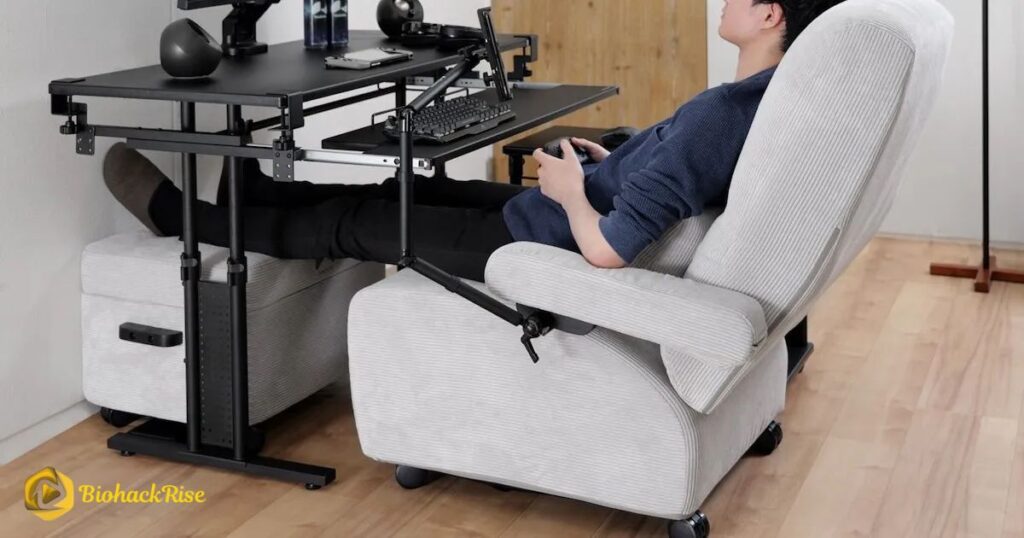How Sleeping in a Chair Affects Your Sleep Stages?
Have you ever fallen asleep in a chair and wondered if it’s okay to stay there all night? A lot of people sleep in chairs, sometimes by choice, sometimes because of health reasons.
But is it good for your body? Or could it cause problems over time?
In this article, we’ll look at the pros and cons of sleeping in a chair. You’ll learn when it’s helpful, when it might be harmful and how to make it more comfortable and safe. We’ll also share tips from doctors, look at the best chairs for sleep and clear up some common myths.
Understanding REM and deep sleep
When you sleep lying flat, your body naturally goes through different sleep stages: light sleep, deep sleep, and REM (rapid eye movement) sleep. Deep sleep and REM are especially important because they help repair your body and improve memory.
When you sleep sitting up, it’s harder for your body to enter these deeper stages. Your muscles stay slightly tense, and your brain may stay more alert, thinking you’re still awake. That’s why even after a long nap in a chair, you might wake up feeling groggy instead of refreshed.
Why does this matter?
Missing out on REM and deep sleep can make you feel tired during the day, affect your focus, and even lower your mood. Over time, poor sleep quality can weaken your immune system and increase the risk of health issues like diabetes and high blood pressure.
How Sleeping Position Affects the Body?
Your sleep position doesn’t just determine how well you sleep, it affects your entire body. From your muscles and joints to your heart and lungs, everything responds differently depending on how you lie (or sit) during rest.
Lying flat allows for more balanced body weight distribution and complete muscle relaxation, which is why beds are traditionally preferred. However, lying flat can worsen certain health conditions like GERD, sleep apnea or back pain.
On the other hand, sitting upright keeps your upper body elevated, which helps prevent stomach acid from creeping into your throat. It can also reduce airway blockage for people with obstructive sleep apnea. However, staying in a seated position too long can lead to stiffness, reduced circulation and, if you’re not careful, blood clots in the legs.
The Best Chairs for Sleeping – What to Look For?

- Reclining angle
The ideal chair should recline at least 135 degrees. Research shows this angle helps reduce pressure on your spine and keeps your airways more open.
- Padding and cushioning
A chair that feels soft but still supports your body is perfect. Memory foam or high-density foam can offer both comfort and structure.
- Lumbar and neck support
Built-in support helps keep your lower back and neck in a natural curve. Some chairs come with removable pillows so you can adjust them to fit your shape.
- Footrest
A footrest isn’t just a luxury, it helps reduce pressure on your lower back and improves circulation by keeping your legs slightly elevated.
Does Chair Sleeping Cause Permanent Damage?
You’ve probably heard someone say, “Sleeping in a chair will ruin your back forever!” But is that really true?
Not exactly.
While habitual, poorly-supported chair sleeping can lead to spinal misalignment and joint strain, the act itself doesn’t automatically cause permanent damage, especially if you’re using a well-designed chair with good ergonomics.
What matters most is posture, duration, and movement. If you sleep in a chair once in a while, or even regularly with the right supports, your body likely won’t suffer lasting effects. But if your chair is sagging, you’re slouched for hours, and you never change positions, then yes—over time, you could end up with chronic pain.
Tips to Avoid Neck Pain When Sleeping Upright
- Use a travel pillow: The U-shaped ones keep your head from falling forward.
- Tuck a small pillow behind your lower back: It helps maintain the natural curve.
- Keep your feet supported: Rest them on a stool or footrest to stop sliding forward.
- Wear a lightweight blanket or shawl: Staying warm helps your muscles relax.
- Shift positions gently: Small movements keep blood flowing.
Real Stories: Why Some People Prefer Sleeping in a Chair?
Story 1: Recovery after surgery
Anna, who had shoulder surgery, found she could only sleep comfortably in her recliner for two weeks. “It saved me from waking up in pain every hour,” she says.
Story 2: Managing acid reflux
David struggled with heartburn every night until he started sleeping partially upright. “I finally slept through the night without the burning feeling,” he explains.
Story 3: Dealing with congestion
During allergy season, Maria finds she breathes better sleeping in a chair. “I wake up less stuffy, and my throat isn’t sore,” she shares.
These stories show it’s not always about choice – sometimes, it’s about comfort or medical need.
Why Do We Fall Asleep in the Chair Without Meaning To?
Have you ever noticed it usually happens in the evening? That’s because your body’s natural circadian rhythm lowers your alertness. If you’re already sitting comfortably after a meal, your body thinks, “Why not rest here?”
It’s especially common when watching TV or reading because your brain is relaxed but still getting light stimulation. The gentle background noise, the dim light – it all tricks your mind into winding down.
The Cultural Side: Sleeping Upright in History
In Victorian England, some people believed that lying flat could cause death because “death laid you down.” Beds were often built to keep people semi-upright, and many even slept in large armchairs or propped up by multiple pillows.
In parts of Asia, monks sometimes meditate and sleep upright. It’s a discipline that trains the mind to stay focused even during rest.
These cultural traditions show that sleeping upright isn’t always seen as strange – sometimes, it’s part of a lifestyle or belief system.
Sleeping in a Chair vs. Sleeping in a Car

Many people compare the two because both involve limited space and an upright posture. But there are differences:
- Chairs usually recline more than car seats.
- Car seats may not support your lower back well, especially for long periods.
- Temperature control is easier indoors.
- In both, adding neck pillows, blankets, and adjusting posture helps a lot.
The Bottom Line – Should You Make It a Habit?
If you do it occasionally, sleeping in a chair is usually harmless. But if it becomes nightly, it might be time to ask why:
- Is your bed uncomfortable?
- Are you experiencing pain when lying flat?
- Do you have a medical condition that makes upright sleeping necessary?
Talk to a doctor if you rely on sleeping upright most nights. Sometimes, small changes – like an adjustable bed or a wedge pillow – can give you the benefits without leaving your bed.
FAQ’s
Can sleeping upright help snoring?
Yes! Elevating your head can keep your airway more open, which might reduce mild snoring.
Will I still dream if I sleep in a chair?
You can, but it might be less frequent or vivid because it’s harder to reach REM sleep.
Is it normal to wake up with numb legs?
Not ideal, it can mean poor circulation. Try moving more during the night or adjusting your position.
What’s the safest angle to sleep upright?
About 30–45 degrees incline helps most people balance comfort and breathing.
Can kids sleep in chairs safely?
Not recommended for long periods, as they need proper support for growing bodies.
Conclusion
Sleeping in a chair can sometimes feel cozy, and it can even help people who have trouble breathing, acid reflux, or pain after surgery. But it’s not always good because it can make your neck and back hurt and might stop you from sleeping deeply. Using a soft, reclining chair with pillows can make it more comfortable.
Some people like to sleep upright for health reasons, and in history, it was even common in some cultures. Still, it’s better to sleep in a bed if you can. It’s important to keep your body supported and change positions to help blood flow. In the end, it’s about what feels safe and comfy for you. And if you often need to sleep in a chair, it’s smart to ask a doctor why.




